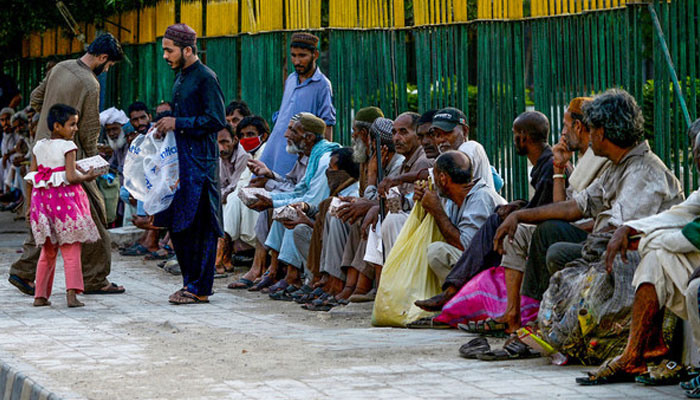How to tackle poverty
LAHORE: Poverty is linked with the level of corruption in a country. Well-governed but natural resources-starved Japan has almost no poor, while poorly governed, resource-rich Pakistan has 40 per cent of its population poor.
Countries everywhere are poor because their governments are corrupt. It is said that the poor feed the rich in Pakistan, which is close to reality. At the peripheries of posh localities, we find slums which are allowed to thrive because children and women living in these slums are essential for maintaining the lifestyle of the rich.
They serve in rich households with miserably low salaries.
In fact, when relatives of the rich visit them from a developed economy, they envy them as all their household chores are performed by servants from slums at miserably low wages.
People living in slums will remain poor for generations to come because every member of each household irrespective of age works in the residence of the rich. It is inhumane and illegal to employ children, but people are rarely held responsible for this corrupt practice.
The poor need fair treatment and the availability of a level playing field to wriggle out of poverty. Governments have to adopt prudent measures to facilitate the poor.
We should look at the measures taken by countries with the same GDP as that of Pakistan that succeeded in eradicating poverty. South Korea is one such example. Decades ago, the per-capita income in South Korea was roughly the same as in Pakistan. Sixty-five years later, there is no comparison between the two economies.
The per-capita income in Pakistan has tripled during this period while that of South Korea has increased 28 times.
To emulate Korea, Pakistan will have to design policies that yield better economic outcomes by empowering the entire population with good health, quality education and ability to withstand challenges like natural disasters.
Empowering Pakistan’s youth with skills and knowledge is another investment that could eradicate poverty.
These young people will not only get jobs in the country but also have access to employment opportunities overseas. The Pakistani immigrant population could double in five years through a careful and well-planned approach of imparting the skills needed in and outside the country.
Aging populations in developed economies need such young skilled people to give a boost to their labour-starved economies. Without sustained economic growth, these aging economies will not be able to generate resources for their ever-increasing elderly population.
Pakistan may well see its workers’ remittances doubling to $60 billion in next five years if a dedicated approach in this regard is adopted.
-
 18-month Old On Life-saving Medication Returned To ICE Detention
18-month Old On Life-saving Medication Returned To ICE Detention -
 Cardi B Says THIS About Bad Bunny's Grammy Statement
Cardi B Says THIS About Bad Bunny's Grammy Statement -
 Major Hollywood Stars Descend On 2026 Super Bowl's Exclusive Party
Major Hollywood Stars Descend On 2026 Super Bowl's Exclusive Party -
 Sarah Ferguson's Silence A 'weakness Or Strategy'
Sarah Ferguson's Silence A 'weakness Or Strategy' -
 Garrett Morris Raves About His '2 Broke Girls' Co-star Jennifer Coolidge
Garrett Morris Raves About His '2 Broke Girls' Co-star Jennifer Coolidge -
 Winter Olympics 2026: When & Where To Watch The Iconic Ice Dance ?
Winter Olympics 2026: When & Where To Watch The Iconic Ice Dance ? -
 Melissa Joan Hart Reflects On Social Challenges As A Child Actor
Melissa Joan Hart Reflects On Social Challenges As A Child Actor -
 'Gossip Girl' Star Reveals Why She'll Never Return To Acting
'Gossip Girl' Star Reveals Why She'll Never Return To Acting -
 Chicago Child, 8, Dead After 'months Of Abuse, Starvation', Two Arrested
Chicago Child, 8, Dead After 'months Of Abuse, Starvation', Two Arrested -
 Travis Kelce's True Feelings About Taylor Swift's Pal Ryan Reynolds Revealed
Travis Kelce's True Feelings About Taylor Swift's Pal Ryan Reynolds Revealed -
 Michael Keaton Recalls Working With Catherine O'Hara In 'Beetlejuice'
Michael Keaton Recalls Working With Catherine O'Hara In 'Beetlejuice' -
 King Charles, Princess Anne, Prince Edward Still Shield Andrew From Police
King Charles, Princess Anne, Prince Edward Still Shield Andrew From Police -
 Anthropic Targets OpenAI Ads With New Claude Homepage Messaging
Anthropic Targets OpenAI Ads With New Claude Homepage Messaging -
 US Set To Block Chinese Software From Smart And Connected Cars
US Set To Block Chinese Software From Smart And Connected Cars -
 Carmen Electra Says THIS Taught Her Romance
Carmen Electra Says THIS Taught Her Romance -
 Leonardo DiCaprio's Co-star Reflects On His Viral Moment At Golden Globes
Leonardo DiCaprio's Co-star Reflects On His Viral Moment At Golden Globes




